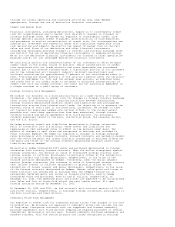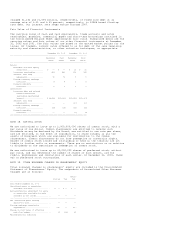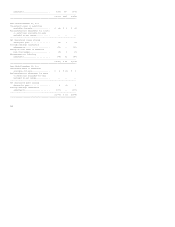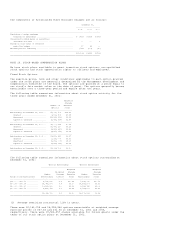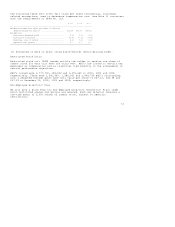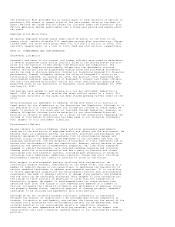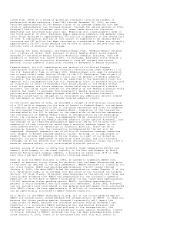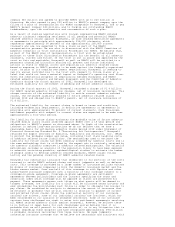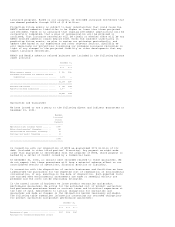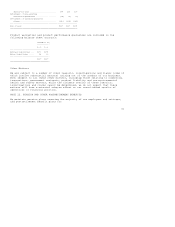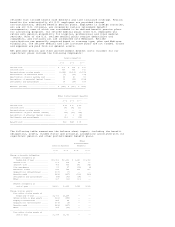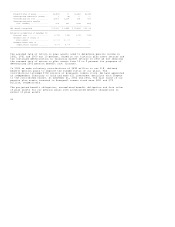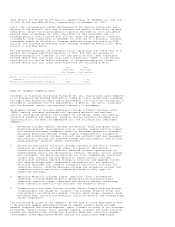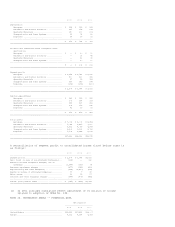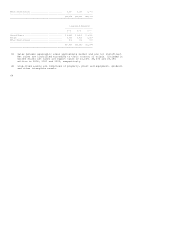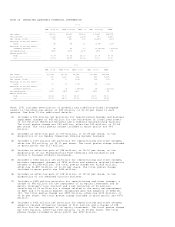Honeywell 2002 Annual Report Download - page 268
Download and view the complete annual report
Please find page 268 of the 2002 Honeywell annual report below. You can navigate through the pages in the report by either clicking on the pages listed below, or by using the keyword search tool below to find specific information within the annual report.company $40 million and agreed to provide NARCO with up to $20 million in
financing. We also agreed to pay $20 million to NARCO's parent company upon the
filing of a plan of reorganization for NARCO acceptable to Honeywell, and to pay
NARCO's parent company $40 million, and to forgive any outstanding NARCO
indebtedness, upon the confirmation and consummation of such a plan.
As a result of ongoing negotiations with counsel representing NARCO related
asbestos claimants regarding settlement of all pending and potential NARCO
related asbestos claims against Honeywell, we have reached definitive agreements
or agreements in principle with approximately 236,000 claimants, which
represents approximately 90 percent of the approximately 260,000 current
claimants who are now expected to file a claim as part of the NARCO
reorganization process. We are also in discussions with the NARCO Committee of
Asbestos Creditors on Trust Distribution Procedures for NARCO. We believe that,
as part of the NARCO plan of reorganization, a trust will be established
pursuant to these Trust Distribution Procedures for the benefit of all asbestos
claimants, current and future. If the trust is put in place and approved by the
court as fair and equitable, Honeywell as well as NARCO will be entitled to a
permanent channeling injunction barring all present and future individual
actions in state or federal courts and requiring all asbestos related claims
based on exposure to NARCO products to be made against the federally-supervised
trust. As part of its ongoing settlement negotiations, Honeywell is seeking to
cap its annual contributions to the trust with respect to future claims at a
level that would not have a material impact on Honeywell's operating cash flows.
Given the substantial progress of negotiations between Honeywell and NARCO
related asbestos claimants and between Honeywell and the Committee of Asbestos
Creditors during the fourth quarter of 2002, Honeywell has developed an
estimated liability for settlement of pending and future asbestos claims.
During the fourth quarter of 2002, Honeywell recorded a charge of $1.4 billion
for NARCO related asbestos litigation charges, net of insurance recoveries. This
charge consists of the estimated liability to settle current asbestos related
claims, the estimated liability related to future asbestos related claims
through 2018 and obligations to NARCO's parent, net of insurance recoveries of
$1.8 billion.
The estimated liability for current claims is based on terms and conditions,
including evidentiary requirements, in definitive agreements or agreements in
principle with approximately 90 percent of current claimants. Once finalized,
settlement payments with respect to current claims are expected to be made over
approximately a four-year period.
The liability for future claims estimates the probable value of future asbestos
related bodily injury claims asserted against NARCO over a 15 year period and
obligations to NARCO's parent as discussed above. In light of the uncertainties
inherent in making long-term projections we do not believe that we have a
reasonable basis for estimating asbestos claims beyond 2018 under Statement of
Financial Accounting Standard No. 5 "Accounting for Contingencies." Honeywell
retained the expert services of Hamilton, Rabinovitz and Alschuler, Inc. (HR&A)
to project the probable number and value, including trust claim handling costs,
of asbestos related future liabilities. The methodology used to estimate the
liability for future claims has been commonly accepted by numerous courts and is
the same methodology that is utilized by the expert who is routinely retained by
the asbestos claimants committee in asbestos related bankruptcies. The valuation
methodology includes an analysis of the population likely to have been exposed
to asbestos containing products, epidemiological studies to estimate the number
of people likely to develop asbestos related diseases, NARCO claims filing
history and the pending inventory of NARCO asbestos related claims.
Honeywell has substantial insurance that reimburses it for portions of the costs
incurred to settle NARCO related claims and court judgments as well as defense
costs. This coverage is provided by a large number of insurance policies written
by dozens of insurance companies in both the domestic insurance market and the
London excess market. Over one-half of this coverage is with Equitas and other
London-based insurance companies with a majority of this coverage subject to a
coverage-in-place agreement. Coverage-in-place agreements are settlement
agreements between policyholders and the insurers specifying the terms and
conditions under which coverage will be applied as claims are presented for
payment. These agreements govern such things as what events will be deemed to
trigger coverage, how liability for a claim will be allocated among insurers and
what procedures the policyholder must follow in order to obligate the insurer to
pay claims. We conducted an analysis to determine the amount of insurance that
we estimate is probable that we will recover in relation to payment of current
and projected future claims. While the substantial majority of our insurance
carriers are solvent, some of our individual carriers are insolvent, which has
been considered in our analysis of probable recoveries. Some of our insurance
carriers have challenged our right to enter into settlement agreements resolving
all NARCO related asbestos claims against Honeywell. However, we believe there
is no factual or legal basis for such challenges and we believe that it is
probable that we will prevail in the resolution of, or in any litigation that is
brought regarding these disputes and have recognized approximately $900 million
in probable insurance recoveries from these carriers. We made judgments
concerning insurance coverage that we believe are reasonable and consistent with


